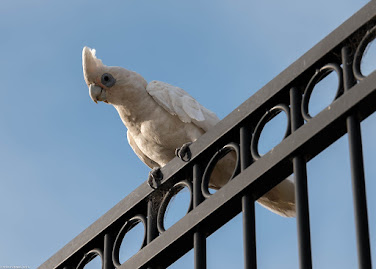Birds falling from the sky near Melbourne shopping centre
Written by: Carlos Tse
Image Courtesy: Flickr - 0ystercatcher
DISCLAIMER: The following story contains images and details of death which may be distressing for some readers. Reader discretion is advised.
Chapters
1. Melbourne mass bird poisoning
2. What happened in this Melbourne Suburb?
3. Will the poisoning ever stop?
Melbourne mass bird poisoning
"I HAVEN'T BEEN MYSELF FOR TWO DAYS, JUST PICKING UP BODY AFTER BODY OR BIRDS THAT ARE HALF DEAD. IT'S HORRIBLE"
On Athol road in Springvale, a suburb east of the Melbourne CBD, hundreds of bird carcasses could be seen littered on public grass, the roof of the local Springvale South shopping centre, nearby houses and under cars.
Image Courtesy: Facebook - Michele Phillips
"WE WALKED THE STREET AND TOOK OVER 200 TO HEALESVILLE, ALL DEAD."
This is what Michele Phillips, who is in charge of South Oakleigh Wildlife Shelter said when asked about the situation. Her and a handful of volunteers spent the weekend removing the deceased avians from roads, the roof of the local shopping centre and the front yards of residents.
She described what seems like an apocalyptic scene, "there were literally birds flying out of the sky falling, they were falling in front of cars and getting run over, they were dead in front of people's houses". These birds were taken to nearby Healesville Sanctuary Wildlife Health Centre, which is where, she told reporters, only 8 survived.
There were concerns of commuter safety, as many of these birds were falling in front of moving vehicles and amid flowing traffic. Birds fell from the sky into the nearby carpark and there were concerns for pedestrians.
Since then, a message has been affixed in the carpark, which is seen on a newly erected sign in the shopping centre's carpark, below.
Image source: Facebook - Krystal Nguyen
"PLEASE DO NOT FEED THE BIRDS - HEAVY FINES APPLY"
John Grant, spokeperson from WIRES, Australia's largest wildlife rescue organisation, said that blood samples from the deceased birds have been sent over to Western Australia and a toxicology report will take few weeks to be finalised. Phillips is adamant that it was a poisoning after open bags of bread crumbs and bird seed were found around the site.
What happened in this Melbourne suburb?
Image Source: Facebook - Michele Phillips
Bird carcasses lined up in a carpark at the Melbourne shopping centre
Bird carcasses lined up in a carpark at the Melbourne shopping centre
Dr Tania Bishop, former WIRES wildlife vet worked on the front line saving lorikeets during an outbreak of LPS (lorikeet paralysis syndrome) near Grafton earlier this year. This case also saw these colourful birds fall out of the sky with over 200 paralysed.
The experienced vet was shocked to see 13-14 mass poisoning events in NSW over the past 12-18 months. Her rescue work during this period revealed sulfur-crested cockatoos and crows were the hardest hit in NSW's recent mass poisoning events. This was on a scale far exceeding anything she'd ever seen in her 25 years in wildlife rescue.
"THEY CAN BE FLYING AND JUST DROP DEAD"
Image Source: Flickr - Ref54
Corellas, which is a subgenus of white cockatoo are extremely social birds. Award winning wildlife photographer Angela Robertson-Buchanan noticed a stark difference between birds in the UK and our native species here in Australia,
"IN THE UK, BIRDS ARE SHY, BUT IN AUSTRALIA, THEY ARE VERY MUCH IN YOUR FACE, AND THEIR PERSONALITIES REALLY SHINE THROUGH."
The former WIRES wildlife vet characterised Corellas as extremely curious, a bit naughty and cheeky. Their inquisitiveness, she said, makes them easy to feed, however, this makes them vulnerable to members of our communities who want to get close to them and seek to harm them. These white birds live in large flocks and are known to vocalise when communicating amongst themselves.
Robertson-Buchanan also works for WIRES and specialises in bird rehabilitation. She noticed that local bird populations have been plummetting as a result of urbanisation, climate change, habitat loss and human occupation.
Will the poisoning ever stop?
Image Source: Flickr - Pavel Sigarteu
The implications of tragedy like this being replicated numerous times in various states (South Australia, New South Wales and Victoria have all had recent mass birds poisonings) is far reaching. Seeing the populations of native bird species shrinking and ecosystems being damaged, Dr Bishop says, "everything has its balance and everything has a flow on effect".
Historically, bird feeding has always been a common past time, however the experienced veterinarian advises against it. Feeding doesn't just make birds prone to poisoning, they can also cause birds to trust people too much which also may lead to other forms of physical cruelty. Other reasons why she explains councils don't allow it, all points back to the well being of our feathered friends. Sick or maimed birds that carry disease tend to join in on these feedings, spreading their illness to other birds. Dr Bishop also explained that birds who are preoccupied during feeding are susceptible to attacks from dogs or cats.
"THIS IS THE MOST COMMON THING WE SEE IN CRUELTY CASES AS WELL AS POISONING CASES, IS FEEDING THEM".
Image Source: Flickr - Studio Sarah Lou
Sulphur-Crested Cockatoo
Angela Robertson-Buchanan suggests putting out fresh water in a protected location for birds and planting native flowers as a source of food, to support these local species. She stresses the interconnectedness that we have with not only birds, but other animals in the ecosystem through the below quote,







Shocking! We should protect and hydrate the birds. What an eye-opening article.
ReplyDelete